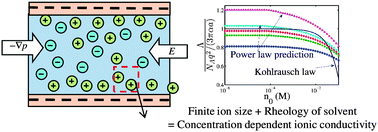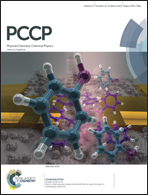Consistent prediction of streaming potential in non-Newtonian fluids: the effect of solvent rheology and confinement on ionic conductivity
Abstract
By considering an ion moving inside an imaginary sphere filled with a power-law fluid, we bring out the implications of the fluid rheology and the influence of the proximity of the other ions towards evaluating the conduction current in an ionic solution. We show that the variation of the conductivity as a function of the ionic concentration is both qualitatively and quantitatively similar to that predicted by the Kohlrausch law. We then utilize this consideration for estimating streaming potentials developed across narrow fluidic confinements as a consequence of the transport of ions in a convective medium constituting a power-law fluid. These estimates turn out to be in sharp contrast to the classical estimates of streaming potential for non-Newtonian fluids, in which the effect of rheology of the solvent is merely considered to affect the advection current, disregarding its contributions to the conduction current. Our results have potential implications of devising a new paradigm of consistent estimation of streaming potentials for non-Newtonian fluids, with combined considerations of the confinement effect and fluid rheology in the theoretical calculations.


 Please wait while we load your content...
Please wait while we load your content...